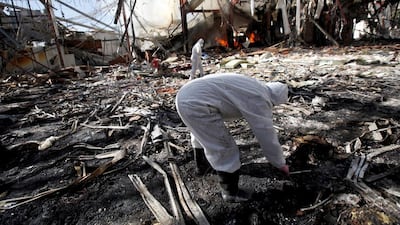Yemen today represents a humanitarian tragedy, with thousands dead, millions with insufficient food supplies and without access to clean water, and many more internally displaced. And while it is unclear how much Aqap and ISIL have benefited from the chaos, the reality is that the continuation of the war is a recipe for further radicalisation.
With these concerns in mind, and international reputational costs of supporting a war that has led to a humanitarian catastrophe rising, the US decided to do something. Except that the Obama administration either has no clue how to end the fighting in Yemen or no desire to expend any political capital to do so in its remaining months in office.
While US secretary of state John Kerry did propose a peace plan during his meeting in Jeddah, even he knows that it is not really a practical plan.
His idea of the cessation of hostilities, the disarmament of the Houthis and their withdrawal from Sanaa and other seized areas, the handover of all heavy and medium-sized weapons to a neutral, third party and the creation of a national unity government, all sounded wonderful on paper, but it is aspirational more than anything else. It also doesn’t offer anything new or different from what the Gulf Cooperation Council put on the table months ago.
If anything, Mr Kerry’s proposal raised more questions than it answers, for the sequencing of all the steps he laid out is a bit unclear and perhaps even controversial. Some say that it diverges from Saudi preferences.
It’s not that the Saudis rejected Mr Kerry’s initiative, but they didn’t endorse it either. Riyadh, for instance, has no interest in giving its blessing to a national unity government before former president Ali Abdullah Saleh and the Houthis turn in their weapons, for fear of giving them political legitimacy prematurely.
The latter, of course, have threatened to cut off the hands that touch their weapons, using language that is very much similar to what the Lebanese Hizbollah has always said about enemies wishing to disarm it. As to the identity of the neutral, third party to which all weapons would potentially be handed, it remains a mystery.
The Saudis have not warmed up the idea yet because they believe that the government of Abdrabu Mansour Hadi should be the sole arms collector. Their reasoning is that the Houthi insurgents seized the weapons from the state in the first place, and therefore should return them to the state.
The Houthis, in return, have little trust in the United Nations or any other external body, should it be tasked with assembling and training an independent Yemeni or international force that would play the disarmament role. But all of this might be irrelevant at the moment because battlefield dynamics do not lend themselves to any major compromises.
There are rumours in Riyadh, the seriousness of which are unclear, of a ground military invasion to force the Houthis’ hand. But there is a realisation that such an operation would come with a heavy price, with the possibility of failure.
Also, the Saudis know that a major military effort in Yemen that does not have the political and military support of the United States has reduced the chances of success.
Increased international attention on the tragic situation in Yemen notwithstanding, the truth is that the conflict is not yet ripe for a solution.
Many have called on the US to freeze the logistical support it is providing to Saudi Arabia, but even if that happens, it won’t bring an end to the conflict.
Neither will Mr Kerry’s predictable diplomacy, which the Houthis rejected anyway.
As is often the case with civil wars, battlefield dynamics will have the most direct impact on the likelihood of peace.
Right now, neither camp seems battered, and therefore neither side is likely to concede. That is precisely why the previous round of peace talks failed.
Bilal Saab is a senior fellow at the Atlantic Council

